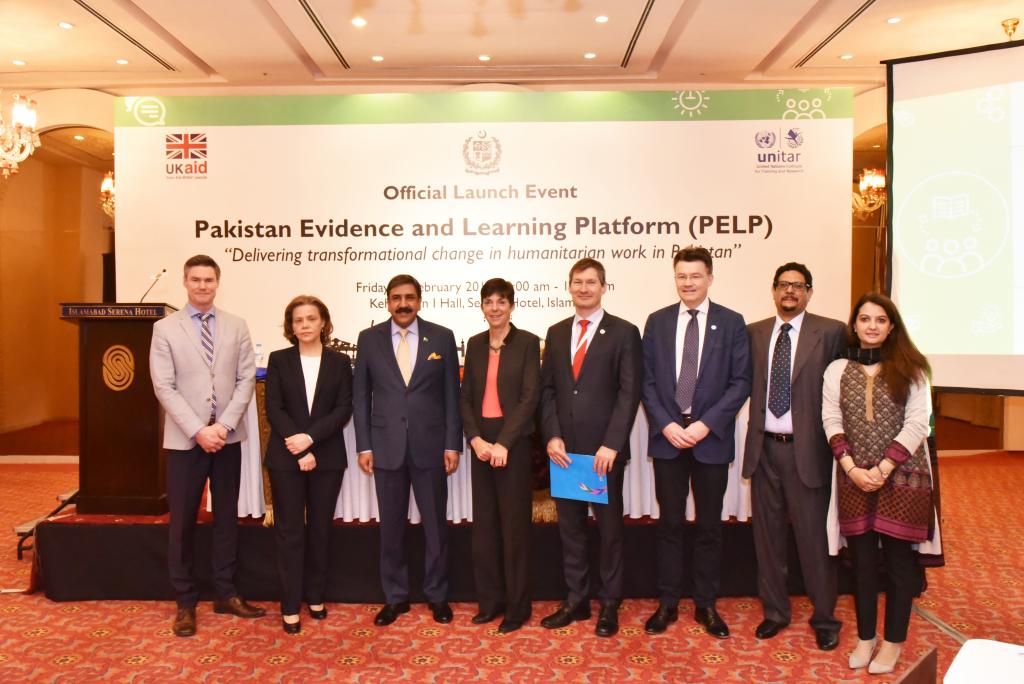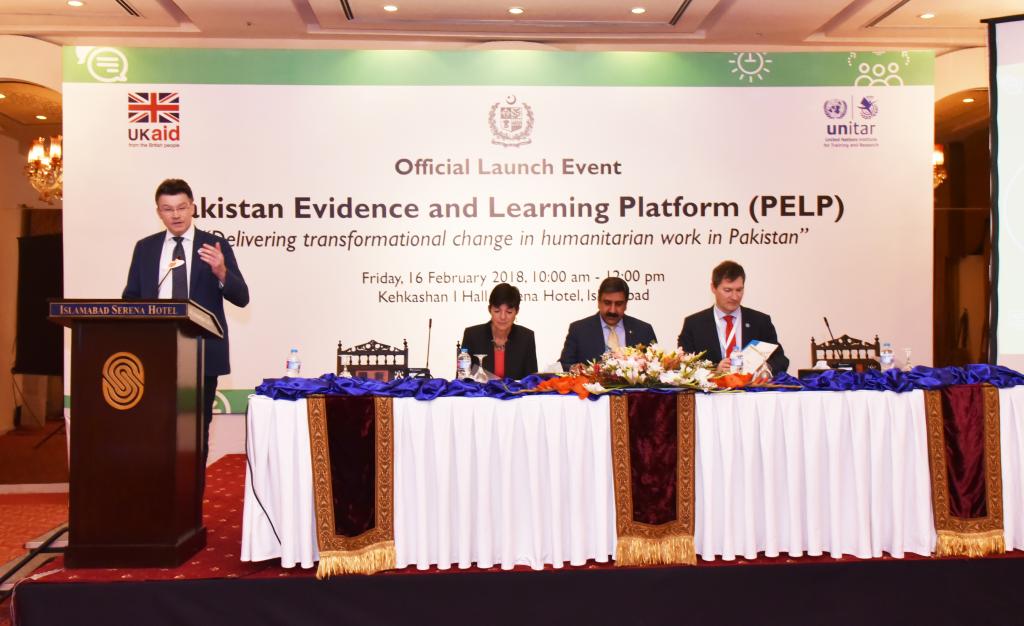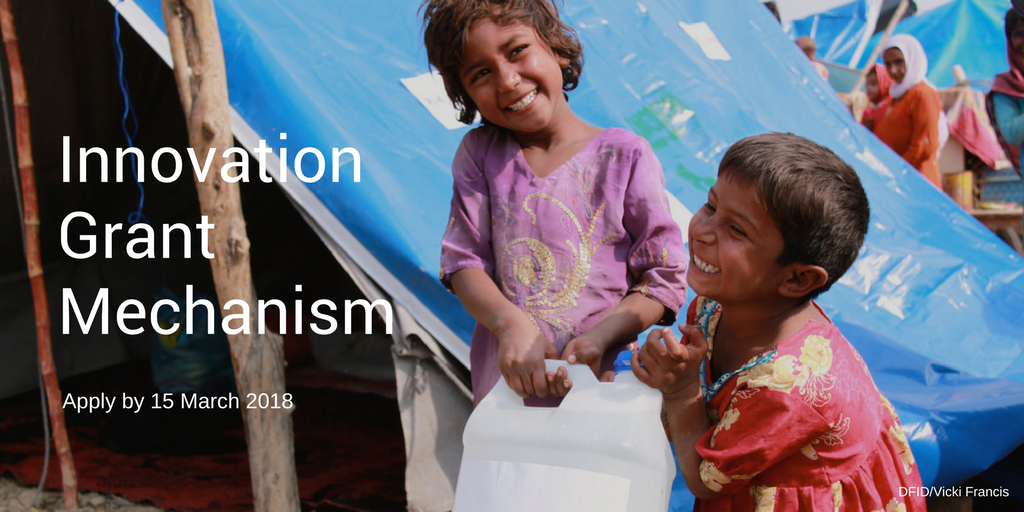DFID and UNITAR Launch Innovative Platform to Deliver Transformational Change in Humanitarian Work in Pakistan

16 February 2018, Islamabad, Pakistan - Future support to Pakistani people needing humanitarian support will be improved, thanks to a new platform launched by the UK Government and UNITAR in Islamabad.
 The Pakistan Evidence and Learning Platform (PELP) aims to improve the humanitarian response in Pakistan through knowledge management, capacity building, and third-party monitoring. It was launched by the United Nations Institute for Training and Research (UNITAR) and the UK’s Department for International Development (DFID).
The Pakistan Evidence and Learning Platform (PELP) aims to improve the humanitarian response in Pakistan through knowledge management, capacity building, and third-party monitoring. It was launched by the United Nations Institute for Training and Research (UNITAR) and the UK’s Department for International Development (DFID).
The humanitarian response in Pakistan needs to be based on cleared evidence and best practices. There are over 5 million people in need of humanitarian assistance in Pakistan. This includes 2.9 million people in FATA, along with those expected to be affected by monsoon flooding.
 The PELP is a component of DFID’s Multi-Year Humanitarian Programme and will contribute to stimulating reforms to the humanitarian system to increase transparency, efficiency and effectiveness in Pakistan’s humanitarian action and planning, as well as help people moving from humanitarian relief towards self-sustaining development and accountability through continuity of learning, innovation and strengthening of national capacities to document and disseminate humanitarian good practices along with reinforcing sub-national capacities and skills for effective humanitarian engagement.
The PELP is a component of DFID’s Multi-Year Humanitarian Programme and will contribute to stimulating reforms to the humanitarian system to increase transparency, efficiency and effectiveness in Pakistan’s humanitarian action and planning, as well as help people moving from humanitarian relief towards self-sustaining development and accountability through continuity of learning, innovation and strengthening of national capacities to document and disseminate humanitarian good practices along with reinforcing sub-national capacities and skills for effective humanitarian engagement.
At the launch event, the DFID Head Ms. Joanna Reid, UN Resident Coordinator and Humanitarian Coordinator for Pakistan Mr. Neil Buhne, Chairman NDMA Lt General Omar Mahmood Hayat, UNITAR Manager of Green Development and Climate Change, Mr. Angus Mackay and UNITAR Manager of Operational Satellite Applications Programme (UNOSAT), Mr. Einar Bjorgo attended the event amongst other participants from the government, UN agencies, donor organizations, international and local NGOs, and academia.
The Head of DFID Pakistan, Ms. Joanna Reid said:
“We know that every year there will be floods and natural disasters in Pakistan, and we should be prepared to cope with the crisis and help save lives. Development will be at its best when we’re all on the same platform. Pakistan Evidence and Learning Platform (PELP) will act as that forum for the humanitarian community to ensure timely humanitarian response based on what works best to help the most vulnerable.”
The PELP Manager of UNITAR, Ms. Bella Evidente also commented:
"PELP aims to deliver transformational change in humanitarian work in Pakistan through the strengthening of knowledge management processes wherein knowledge is created, shared and transferred, promoting innovative thinking and facilitating a new way of working.
While PELP is closely associated with humanitarian work, it also contributes to the 2030 Development Agenda and in bridging the gap between humanitarian relief and development".
At the launch event, the call for proposal of the Innovation Grant Mechanism was officially announced and led by Einar Bjorgo, UNOSAT Manager.
The PELP Innovation Grant Mechanism is designed to boost innovation in support of the humanitarian to development nexus in Pakistan. It aims at identifying and supporting the development, testing and potential scaling up of innovations for humanitarian action.
The Grant Mechanism promotes sustainability as a key focus for innovation in humanitarian action. It also encourages collaboration between actors, including the private sector, to co-invest in ideas that can influence humanitarian action for greater impact. In practice this means identifying solid people-centered innovative solutions, testing them and learning from their results to advance humanitarian action in Pakistan.
To apply, please go to: /ccp/pelp-innovation-grant-mechanism-call-proposals
The photos of the PELP official event is available here.
About the PELP
The Pakistan Evidence and Learning Platform (PELP) is funded with UK Aid from the UK government. The PELP strengthens knowledge management in the humanitarian sector thereby ensuring a continuously improving humanitarian response. The PELP seeks to increase the accountability, transparency and effectiveness of the humanitarian system through three interconnected components: a knowledge and learning hub; third party monitoring; and an innovation grants mechanism. The PELP will initially be linked to the UN Resident Coordinator’s Office, and gradually transferred to national entities ensuring longer-term sustainability.
Photo 1: The logo of UK Aid, the Government of Pakistan and UNITAR.
Photo 2: The group photo at the PELP launch event.
Photo 3: UNITAR Manager of Green Development and Climate Change, Mr. Angus Mackay.
Photo 4: The Head of DFID Pakistan, Ms. Joanna Reid.
Photo 5: The PELP Innovation Grant Mechanism campaign card.


